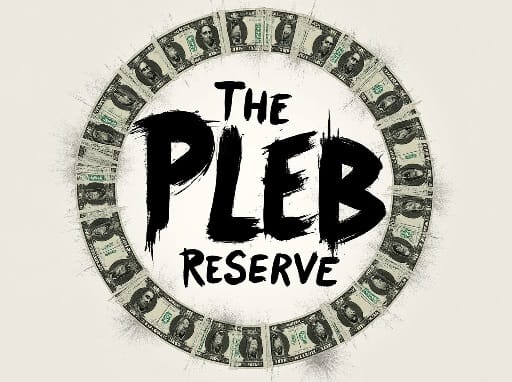Mama, What's Inflation Mean?

Forrest: "Mama, what’s inflation mean?"
Mrs. Gump: "Well, Forrest, inflation is like when you have a box of chocolates, but every time you go to get one, it costs a little bit more. The more they cost, the less you get to enjoy 'em."
Forrest: "So, it's like they're takin' away chocolates while I'm not lookin'?"
Mrs. Gump: "That's right. It's when your money don’t quite stretch as far as it used to. You might still have the same amount of dollars, but they just don’t buy as much."
Forrest: "Oh, I get it now. So, like when I tried to buy a Dr. Pepper the other day, but it cost two nickels more than last time."
Mrs. Gump: "Exactly, Forrest. That’s inflation. Prices go up, but your money stays the same! You just have to make sure you manage what you got, so you don’t end up with no chocolates at all."
Forrest: "Life is like a box of chocolates, but with inflation, there’s a lot less chocolate to go around."
Mrs. Gump: "That’s a good way to put it, dear."
What is inflation, how does it occur, and is it necessary?
Most of us collide with the phenomenon known as inflation early on in our journey. We hear the adults around us complain about higher prices. Gas, groceries, movie tickets, candy,
"Back in my day"...
Inflation is often explained away as a natural effect of a healthy, growing economy. Another one of those things in life as sure as death, taxes, and the sun rising up over the hills tomorrow.
Inflation. Natural, normal, and even a good thing.
But maybe not.
If not, what's really going on?
If we were to ask our friend Mr. Gump about inflation, he may opine -
"Inflation ain’t entirely natural. It’s like when they print too much money, and then everything costs more, but folks’ paychecks don’t go up. It just makes life harder for everyone, like runnin’ with your shoes tied together."
Thanks, Forest. Oftentimes simplicity is a strength, not a weakness. But, inflation and economics can be confusing and controversial. So let's dive in a bit further.
First we have natural inflation, which is the rise in prices due to fluctuations in supply and demand.
Supply and demand combine to set the price of goods and services in the market place. When demand increases or supply decreases- prices will tend to rise. The opposite is true (prices fall) if demand decreases or supply increases.
We saw this on steroids during the Covid-19 pandemic. We had production and distribution challenges on a grand scale, but people still needed their stuff. Prices of everything from lumber to toilet paper shot up. People panicked and stockpiled, further reducing the supply available in the market place. As things began to calm down- prices fell and the markets moved back towards an equilibrium.
Then there is the other side of inflation that is less advertised. That is, inflation as the direct result of government overspending.
There is a cost for everything the government wants to do.
Fund healthcare, build roads, provide education- the money has to come from somewhere.
There are no free rides.
Rather than selling widgets, the government generates its income through taxes and fees. But oftentimes this income isn't quite enough to cover the bills.
Actually, this has been the case almost every year since 1970. In 2023 alone, the US ran a deficit of ~$1.7 Trillion dollars. When there's a shortfall, the government borrows money by issuing treasury securities (bonds).
Bonds are IOU's that pay interest and mature at a future date.
- The investor(s) buy the bond- lending money to the issuer (in this case, the government).
- The investor(s) collect interest payments over the life of the bond, paid out by the issuer.
- When the bond matures, the investor(s) also receive back the original amount they paid for the bond.
One of the top purchasers of these bonds is the Federal Reserve.
Where do they get their income to buy such bonds, you may ask?
Good question.
They create it out of thin air.
Yes- while you and I spend our time and energy chasing the greenbacks, the Fed simply clicks a mouse button.
More and more money gets injected into the system.
Without an equal rise in goods or services, our purchasing power gets watered down like a bowl of soup.
Thus- your money doesn't stretch as far.
Prices of healthcare, groceries, education, and energy shoot up.
You are now working harder, longer. Perhaps looking for a side hustle.
Spending more time away from your family.
They're taking away chocolates while your not lookin'.
Slowly, but surely.
What do the economists have to say about all this? There are two different schools that butt heads.
Keynesian economists are hands on.
They favor the use of tools to sustain and stabilize an economy.
A combination of money printing, interest rates, and forecasting.
In need of a boost?
Turn on the money printer and lower interest rates.
Things a bit overheated?
Raise interest rates and sell back some of the bonds they purchased with the printed money (reducing the money in circulation).
Austrian economists are hands off.
They believe in natural market forces and limited government intervention.
They claim that the heavy handed approach favored by the Keynesian camp distorts market signals and mis-allocates resources.
Without government intervention- prices will fall over time as productivity and technology advance.
We've clearly gone all in on the Keynesian way.
We've handed the government a blank checkbook.
We're letting them play god and disrupt natural economic forces.
Take a look around.
Is this path ideal?
More importantly, is it sustainable?
History is not on our side.
Social unrest.
Eroding trust.
High levels of uncertainty.
Consume, consume, consume.
Environmental destruction.
Savers are losers while prosperity compounds for those already well-off.
Housing, food, healthcare- unaffordable for many.
A ballooning and increased US debt burden- good luck kiddo's.
Yes- these are all connected to our topic of the day.
What can we do about it? What will you do about it?
Just keep running' on the hamster wheel, or jump off?

Member discussion